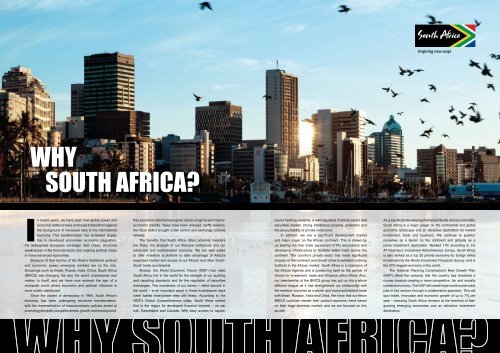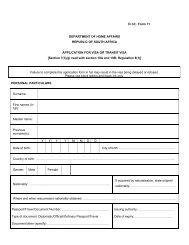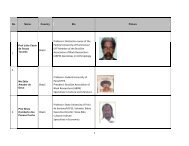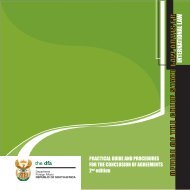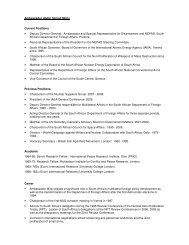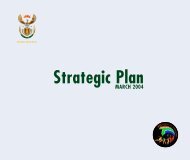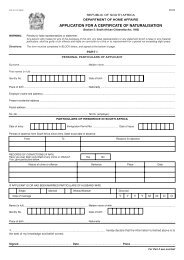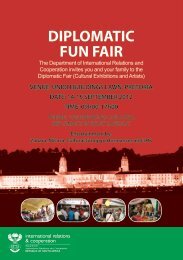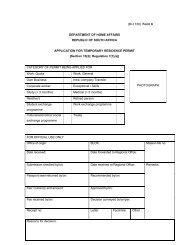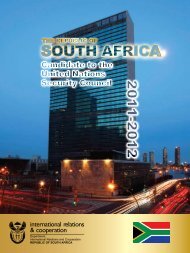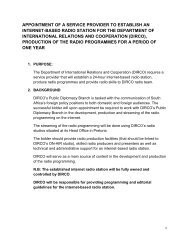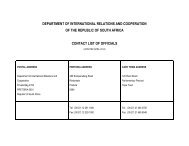UBUNTU Magazine Issue 1 - Department of International Relations ...
UBUNTU Magazine Issue 1 - Department of International Relations ...
UBUNTU Magazine Issue 1 - Department of International Relations ...
You also want an ePaper? Increase the reach of your titles
YUMPU automatically turns print PDFs into web optimized ePapers that Google loves.
Inspiring new ways<br />
WHY<br />
SOUTH AFRICA?<br />
North Beach in Durban in South Africa<br />
In recent years, we have seen how global power and<br />
economic relations have continued to transform against<br />
the background <strong>of</strong> increased risks to the international<br />
economy. This transformation has increased largely<br />
due to developed economies’ economic stagnation,<br />
the widespread European sovereign debt crises, structural<br />
weaknesses in the financial sector and ongoing political crises<br />
in many advanced economies.<br />
Because <strong>of</strong> this decline <strong>of</strong> the West’s traditional political<br />
and economic power, emerging markets are on the rise.<br />
Groupings such as Brazil, Russia, India, China, South Africa<br />
(BRICS) are changing the way the world understands and<br />
relates to itself, and we have now entered the age <strong>of</strong> a<br />
multipolar world where economic and political influence is<br />
more widely distributed.<br />
Since the advent <strong>of</strong> democracy in 1994, South Africa’s<br />
economy has been undergoing structural transformation,<br />
with the implementation <strong>of</strong> macroeconomic policies aimed at<br />
promoting domestic competitiveness, growth and employment.<br />
Key economic reforms have given rise to a high level <strong>of</strong> macroeconomic<br />
stability. Taxes have been reduced, tariffs lowered,<br />
the fiscal deficit brought under control and exchange controls<br />
relaxed.<br />
The benefits that South Africa <strong>of</strong>fers potential investors<br />
are firstly, the strength <strong>of</strong> our financial institutions and our<br />
advanced and sophisticated economy. We are well suited<br />
to <strong>of</strong>fer investors a platform to take advantage <strong>of</strong> Africa’s<br />
expanded market and access to our African and other South-<br />
South trade counterparts.<br />
Already, the World Economic Forum (WEF) has rated<br />
South Africa first in the world for the strength <strong>of</strong> our auditing<br />
and reporting standards and for the regulation <strong>of</strong> securities<br />
exchanges. The soundness <strong>of</strong> our banks – rated second in<br />
the world – is an important asset in these troublesome days<br />
when banks everywhere else are shaky. According to the<br />
WEF’s Global Competitiveness Index, South Africa ranked<br />
first in the region for developed financial markets – on par<br />
with Switzerland and Canada. With easy access to capital,<br />
sound banking systems, a well-regulated financial sector and<br />
securities market, strong intellectual property protection and<br />
the accountability <strong>of</strong> private institutions.<br />
In addition, we are a significant development market<br />
and major player on the African continent. This is shown by<br />
us leading the free trade agreement (FTA) discussions and<br />
developing infrastructure to facilitate better trade across the<br />
continent. Our country’s private sector has made significant<br />
inroads on the continent and should strive to establish a strong<br />
foothold in the African market. South Africa is a champion <strong>of</strong><br />
the African Agenda and is positioning itself as the partner <strong>of</strong><br />
choice for investment, trade and influence within Africa. Also,<br />
our membership <strong>of</strong> the BRICS group has put us into a whole<br />
different league as it has strengthened our relationship with<br />
the member countries as a whole, and improved bilateral trade<br />
with Brazil, Russian, India and China. We know that our fellow<br />
BRICS countries started their upward economic trend based<br />
on their huge domestic market; and we are focused on this<br />
as well.<br />
As a significant developing market politically and economically,<br />
South Africa is a major player on the continental and global<br />
economic landscape and an attractive destination for inward<br />
investment, trade and business. We continue to position<br />
ourselves as a leader on the continent and globally as a<br />
prime investment destination. Ranked 11th according to the<br />
AT Kearney’s Investment Attractiveness Survey, South Africa<br />
is also ranked as a top 20 priority economy for foreign direct<br />
investment by the World Investment Prospects Survey, and is<br />
the 27th-biggest economy in the world.<br />
The National Planning Commission’s New Growth Plan<br />
(NGP) <strong>of</strong>fers the certainty that the country has chartered a<br />
course towards creating a more competitive, fair and socially<br />
cohesive economy. The NGP will create large-scale sustainable<br />
jobs in key sectors through a collaborative approach. This will<br />
spur trade, innovation and economic growth <strong>of</strong> up to 7% per<br />
year – ensuring South Africa remains at the forefront <strong>of</strong> fastgrowing<br />
emerging economies and an attractive investment<br />
destination.<br />
12 <strong>UBUNTU</strong> diplomacy in action <strong>Issue</strong> 1 www.dirco.gov.za DIRCOza<br />
@theDIRCOza thedircoza<br />
<strong>Issue</strong> 1 diplomacy in action <strong>UBUNTU</strong> 13


